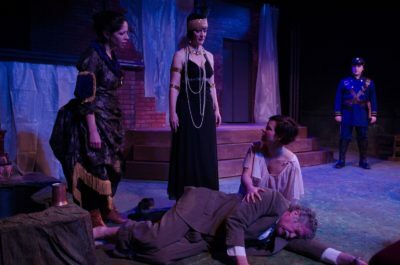Eurydice
By Sarah Ruhl.
Directed by Nicole Hand.
Produced by Promethean Theatre Ensemble.
At Athenaeum Theatre, Chicago.
“How does one remember to forget?”
Lethe, Here I Come!
After almost one year since its last Chicago production (eight months and five days, to be exact), Sarah Ruhl’s Euridyice returns this week, this time under the direction of Nicole Hand of Promethean Theatre Ensemble. The temporal proximity of these two productions might lead one to expect that this production entertains some fresh and nuanced take on the play—or that, at least, it entertains at all. Wrong. A seemingly interminable 90 minutes of twee poetic schmaltz and affectedly clawing, mawkish performances, Promethean’s Eurydice is Ruhl’s tragic imagination played out in a slow and banal motion. Never has love seemed so empty and death so envious a fate.

The vibrant and buoyant Eurydice (Janeane Bowlware) is in love with her dreamy, flowy-locked musician-boyfriend Orpheus (Jordan Golding): such can be deduced from the emotionally overwrought opening scene of Eurydice, in which Orpheus, strumming upon his guitar, proposes to the jubilant Eurydice the birds, the sea, the sky, etc., until, at last, he proposes in earnest with a lowly red string—an object telling of both his paltry remuneration as an artist and the paltry sentimentality that runs through the whole of this play like the unraveled noose of a licorice whip.
Eurydice—being in love and having no “interesting” argument to the contrary—of course accepts his proposal. But, on her wedding day, a suave, well-dressed Nasty/Interesting Man (Jared Dennis) shows up and lures her away to his high-rise condo with the assurance that he has in his possession a letter addressed to her from her deceased Father (Sandy Elias). Eurydice is sufficiently enticed and goes along with the Man—only then to fend off his trespassing charms, letter in hand, and fall headlong down a long stairwell into Hades! Such is mythical life.
In Hades, the now-dead Eurydice, doused into oblivion by the waters of Lethe, is greeted by a chorus of three strict stones (Susie Griffith, Meghann Tabor, and Brendan Hutt), all of whom adhere adamantly to the rules of the dead (e.g. no crying). Shortly, Eurydice is discovered by her Father (whom she does not recognize), and he begins to care for her by making her a room (out of string, of all things!) and teaching her many useless words with dubious attention to accuracy in definition (e.g. peripatetic). Such are mythical—and realistical—fathers.

Eventually, upon hearing anew her beloved’s name (i.e. Orpheus), Eurydice’s memory is restored, and we are then suffered sentimental scenes of reunion between father and daughter. Meanwhile, up on planet earth, Orpheus conspires to descend into Hades to rescue his wife and muse; mythaculously, with only a song and a straw, he is successful. Confronting below the Lord of the Underworld (also Jared Dennis), Orpheus is granted Eurydice’s return—but on the strict condition that he does not look at her until after they have both exited Hades. Faced with a mortality with her lover or an eternity with her beloved Father, Eurydice must now choose between them. Such is Ruhl’s Eurydice.
Given that, by their own admissions, both playwright Ruhl and director Hand have experienced the deaths of their fathers, and assuming that they both, too, have experienced the sweets and bitters of love, Promethean’s production of Eurydice is an insult to true sentiment, a mockery of true loss, and, take-all, a parody of honest, heartfelt theatre. Even granting that Ruhl’s play is a work of mythic imagination, to find such shallow feeling in so superficial performances only exaggerates distinctly the mawkish whimsy of her vacuous verse.
Director Hand’s vision of Eurydice’s world comes across as only half concocted. In effect a two-tiered set with a dilapidated brick façade half-obscured by a white, translucent tarp, the “place” of this world is highly ambiguous and suggests virtually no atmosphere to either the realm of the living or of the dead. The nicest touch is an elevator and sliding door, through which the newly deceased enter and in which they are sprinkled with the waters of Lethe (thereby losing their memories). But neither this embellishment nor even the stony inhabitants of Hades, each of whom are dressed like figures from the past—a half-cocked nod toward some theme of “nostalgia”—can redeem this set’s production value in some coherence of “world.”
When the most honest and affecting performance in a play about love and loss is that of a stone—who, mind you, is not even supposed to have any emotion to show—there is something terribly wrong in a production. (That stone, by the way, is Meghann Tabor: congrats to you, Little Stone!) Bowlware’s Eurydice is gratingly superficial; like Golding’s Orpheus, her broadcast of emotions, in physicality, expression, and voice, so far exceeds that which is actually palpable in the feeling of her performance that it is physically and emotionally tiring to watch (point and case: the man seated next to me continually nodded off throughout the production). If one wanted to be lied to for 90 minutes, there’re spectacles like political debates scheduled for that express purpose; one comes to the theatre for the truth.
Dennis, as both the Nasty/Interesting Man and Lord of the Underworld, while succeeding to be the least affected of the principals, nevertheless delivers a lackluster and unvaried performance, managing to avoid being both Interesting and Nasty—the first of which may be excused by his character’s own admission; the second (speaking as a man myself) is just from lack of trying. And Elias’ Father falls somewhere in between these two extremes in a daft and rote performance that suggests as much paternal affection as the periodic appearance of the Man in the Moon.
If ever Sarah Ruhl’s Eurydice is worth seeing, Promethean’s current production is not the production in which to do so. Fortunately (or unfortunately), it seems to be a play that’s produced with the frequency of a national crisis, when peoples’ moods turn dour and the tragic resentment of their lives aches to be purged in a bath of bathos. So invest your twenty-odd bucks in a one-year CD. The answer as to “how to remember to forget” a bad production is to never have seen it at all.
Not Recommended.
August Lysy.
Reviewed on 14 January 2017.
Playing at the Athenaeum Theatre, Studio One, 2936 N. Southport Ave., Chicago. Tickets are $27, with $22 tickets for Seniors and $17 tickets for Students/Children. For tickets and information, call the 773-935-6875, or visit PrometheanTheatre.org. Performances are Thursdays, Fridays, and Saturdays at 7:30 p.m., and Sundays at 2:00 p.m. through February 11th (Note: Industry Night is Monday, January 16th at 7:00 p.m.). Running time is 90 minutes with no intermission.

